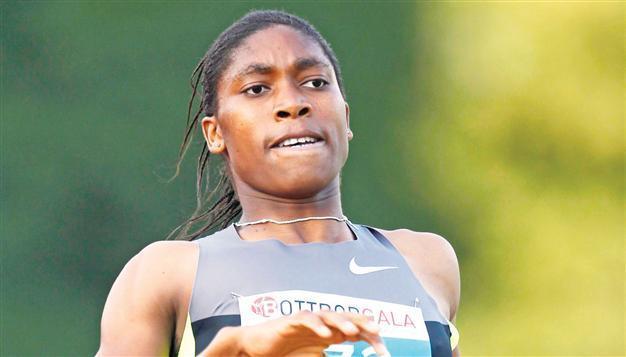Controversy behind me, says Semenya
LONDON - Agence France-Presse

Caster Semenya takes part in the 800m competition at an athletics meeting. REUTERS photo
South African 800m runner Caster Semenya said yesterday her controversial victory in the 2009 outdoor world championships was behind her and she was solely focused on adding Olympic gold.The 21-year-old - who is coached by 2000 Sydney Olympics 800m champion Mutola from Mozambique - had to undergo drug tests followed by gender tests following that magnificent victory in Berlin. The situation spiralled out of control with Caster complaining of “unwarranted and invasive scrutiny of the most intimate and private details of my being”.
She was barred from the track for almost a year before being cleared to run again and her comeback was hampered by a lower back injury and a growing belief that coach Michael Seme had taken her as far as he could.
Eyes on gold
However, she told several British national newspapers yesterday that nightmare was all in the past and she wanted to go on and win the gold - something if she does achieve she will dedicate to the increasingly frail South African political icon Nelson Mandela, who celebrates his 94th birthday on Wednesday.
“That is in the past,” she said. “You need to concentrate on the future. I don’t have to entertain those things now. I can concentrate on my running, that’s all.
“With each year I experience I become a more relaxed athlete. I also know what is important to listen to and what to ignore.
“I try to run my best always but sometimes I do not and I have to deal with negatives. People ask questions that can make you sad, but I must always stay positive.
Acting professional
“That’s what I have to learn. I have to act professionally. But this is my first Olympics so London will be special for me.”
Semenya, whose fastest time this year 1min 59.18sec has been bettered five times by 2008 Olympic gold medalist Pamela Jelimo of Kenya, recalled the first time she met Mandela, the dashing lawyer who spent 27 years in jail for opposing apartheid before becoming the first leader of a non-racial South Africa.
“The first time I met Mandela he was just looking at me as a little tiny girl,” she said.
“I was a little bit small but he said: ‘I believe in you, so you go out there and make me proud’. So I kept the spirit and the legacy.
“Everything I do, I do it for him. He made me believe in the dark days after my victory. He inspired me a lot and he continues to do so.”
















